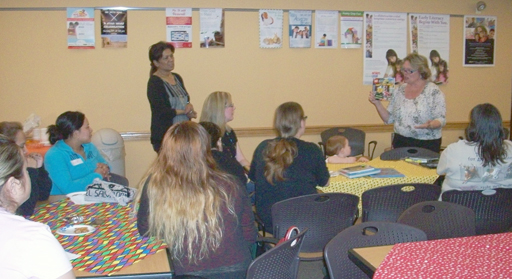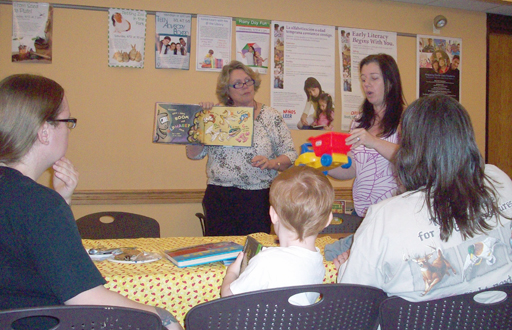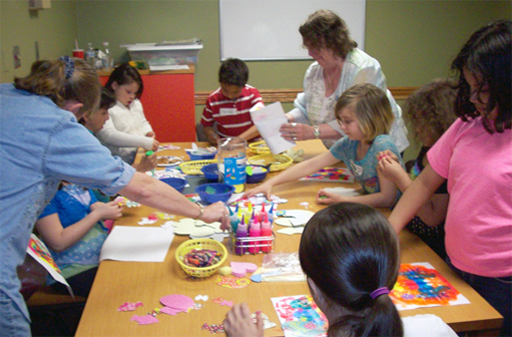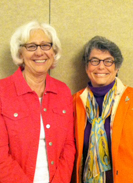The Harvard Family Research Project separated from the Harvard Graduate School of Education to become the Global Family Research Project as of January 1, 2017. It is no longer affiliated with Harvard University.

|
June 9, 2014 Libraries Helping to Close the Opportunity Gap: Maryland Library PartnershipNathan Driskell |
Article Information
- Full Text (HTML)
- Full Text (PDF: 394 kb)
Spotlight On…Federal Partnership to Promote Early Learning in Libraries
The Maryland Library Partnership is a promising “on-the-ground” example of leveraging libraries to support early childhood development. Libraries’ potential to promote early learning is also permeating the conversation at the national level. Recently, three high-profile federal agencies partnered to promote early learning in libraries: the Institute of Museum and Library Services, the Office of Head Start, and the Office of Child Care. Learn more about this partnership.
Read the policy report by the Institute of Museum and Library Services, which calls on policymakers to incorporate libraries and museums into early childhood interventions in order to close the vocabulary gap between low-income early learners and their peers.
FINE Newsletter, Volume VI, Issue 3
Issue Topic: Expanding Opportunity: The Potential of Anywhere, Anytime Learning
Voices From the Field
Are you looking for an accessible, welcoming community resource to help close the word gap between low-income learners and their peers? Look no further than your local library. The research is clear: Libraries have the resources and expertise to assist in preparing early learners for school. In their recent work, Susan Neuman and Donna Celano explore these often-overlooked and little-understood community resources, and suggest their potential for improving literacy for students affected by poverty. To date, few state and local education systems have taken the lessons from this study to heart. However, one state system stands out for its exemplary efforts to integrate and support local libraries: Maryland. A Race to the Top-Early Learning Challenge grant has allowed Maryland to provide significant funding and technical assistance to its libraries, and the state hopes to see improvements in both family engagement and early childhood literacy as a result.
| The Maryland Family Engagement Coalition is the body charged with implementing the family engagement strategic plan outlined in the state’s Race to the Top-Early Learning Challenge application. The Coalition has focused on bringing stakeholders together to integrate family engagement efforts across the state; expanding the definition of learning environments in order to promote learning anytime, anywhere; and building the capacity of providers to deliver more customer-friendly, high-quality services to families. These three pillars of the Coalition’s work are embodied in the Maryland Library Partnership. |
An innovative collaboration between the Maryland Association of Public Library Administrators (MAPLA) and the Maryland State Department of Education, the Maryland Library Partnership project provides targeted training and capacity building to librarians statewide in order to enable them to offer welcoming environments to families and serve them more effectively.
At the heart of the Library Partnership is a customer-centered approach that puts disadvantaged families and children first. The Library Partnership seeks to improve the quality of parents’ interactions with library staff, increase the frequency of families’ engagement with libraries, and encourage families to take greater advantage of other social services in their communities. In order to meet these goals, libraries engaged in the Library Partnership promote a customer-friendly atmosphere conducive to learning, and target their services to the learning needs of individual families. These libraries also encourage families to spread the word not only about the library but also about other resources in the community, including GED programs, Head Start, addiction recovery programs, and child care agencies. Library Partnership activities include Library Cafés, which are held twice a year for families. The Library Café model involves carefully facilitated training for families, along with relationship- and community-building exercises.

The Library Partnership represents a fundamental rethinking of the role of the library—from providing occasional opportunities for children to engage with reading to serving as a central point of connection linking families to all the resources that they need to promote their child’s literacy. Kathleen Reif, director of the St. Mary’s County Library System, explains the problem that led Maryland’s librarians to undertake this transformative work:
| Librarians can’t expect to see children every day. However, we can reach the adult or adults who are in a child’s life every single day. Once we realize that, our role becomes to provide adults with resources and knowledge they need to maximize their daily interactions with children. |
In order to help librarians reconsider their role in such a transformative way, Reif and her colleagues relied on Susan Neuman’s Every Child Ready to Read @ your library, a high-quality, evidence-based curriculum for promoting literacy published by the American Library Association. Ensuring that librarians across the state were trained to implement this curriculum with fidelity has required a slow and intentional scaling process. There were only five Library Partners in the initial cohort, funded by the first year of the Early Learning Challenge award. In the “train-the-trainer” model developed by MAPLA, each member of the past cohort has taken a mentee, growing the model year by year. Currently, 17 libraries participate in the program. MAPLA and the Maryland State Department of Education ensure that not only current new partners but also graduates of the training program maintain fidelity to the program’s goals.

By reconsidering the target audience of librarians from the child to the parent, Reif and her colleagues have created a promising model of community engagement in their libraries. But doing so has not been a simple task. It has required a dedicated, supportive partnership between the library system and the Maryland State Department of Education. In 1998, MAPLA successfully advocated for a seat on the state’s Early Childhood Advisory Council. This seat in a statewide decision-making body ensures that librarians’ perspectives have been reflected in decisions related to early childhood education reform for well over a decade. Reif attributes the prominence of the Library Partnership in Maryland’s Race to the Top application to MAPLA’s inclusion in the Early Childhood Advisory Council, as well as a long-standing culture of respect for librarians in Maryland.
A decade of collaboration and participation in statewide decision-making processes has positioned Maryland’s libraries well as they embark on the challenging work outlined in the Race to the Top proposal. Nevertheless, the Library Partnership regularly encounters challenges in translating state-level policy to ground-level practice. A few of those challenges will likely be familiar to many family engagement practitioners: providing transportation to families, particularly in rural areas; securing high-quality translators, particularly in communities that speak a wide variety of languages; offering food to diverse groups with a broad range of tastes and dietary restrictions; and sustaining funding for the initiative after the federal Race to the Top grant period ends. Other challenges might be more surprising, and point to the nascent and untested nature of family–librarian partnerships. For example, Maryland State Department of Education Public library consultant Paula Isett describes overdue book fines as one of her greatest challenges in helping libraries to reach more families. Faced with the competing imperatives of welcoming more underprivileged families yet at the same time enforcing institutional regulations, librarians often do not know how best to proceed. Isett applauds several creative librarians who are promoting innovative “Read to Forgive Overdue Fines” programs. These initiatives allow families that commit to reading with their children for a set number of hours each week to have their overdue fees waived. Such plans promote structured, ongoing reading between parents and children while welcoming lapsed members of the library community back into the fold.

Despite these challenges, the Maryland Library Partnership is proud of a number of preliminary successes. In future years, a $500,000 grant from the Public Library Association will support an evaluation of the Every Child Ready to Read @ your library curriculum. For now, Reif and Isett both point to increased parent attendance at libraries and highly positive feedback from parents about the welcoming climate and useful resources that the Partnership provides. Furthermore, the Library Partnership has been embraced by librarians across the state, despite the tremendous work it requires of them. “Family engagement—putting yourself out there to serve families—is much harder than traditional ‘story time,’” Isett explains. Nevertheless, the feeling among librarians is “we are going to continue doing this, even though it is such a hard thing.” With engaged librarians across the state committed to offering families warm and welcoming learning environments outside of school, Maryland’s Library Partnership promises to serve as a model for innovative family engagement across the country.
 |
| Paula Isett and Kathleen Reif |
Paula Isett is a public library consultant with the State Library Agency of Maryland. After 15 years in the early childhood field in a number of positions (director, kindergarten teacher and family child care provider), Paula joined with public libraries to foster early childhood learning and literacy. She is a member of the Family Engagement Coalition, which created Maryland's Early Childhood Engagement Framework, and works closely with the Early Childhood Division of Maryland State Department of Education to foster early childhood programs in public libraries.
Kathleen Reif is director of St. Mary's County Library and co-chaired Maryland's Public Library Administrators Birth to Five Taskforce, which resulted in a statewide "It's Never Too Early" public awareness campaign. She has represented public libraries on Maryland's Early Childhood Advisory Council since it was created in 2010, and is a member of the Family Engagement Coalition which created Maryland's Early Childhood Engagement Framework. Kathleen is a passionate believer in the power of effective public libraries to engage families in the lives of their children, and she has worked with many state and local agencies to ensure that the local public library is a member of the community team addressing the needs of families.
About the Author: As a graduate research assistant at the Harvard Family Research Project, Nathan Driskell documents state family-engagement strategies in early childhood practice. Previously, he served as a program associate at the Flamboyan Foundation in Washington, D.C.
This resource is part of the June FINE Newsletter. The FINE Newsletter shares the newest and best family engagement research and resources from Harvard Family Research Project and other field leaders. To access the archives of past issues, please visit www.hfrp.org/FINENewsletter.
